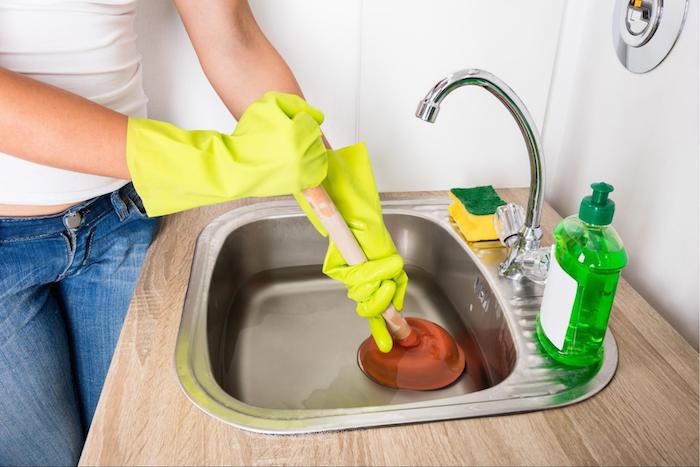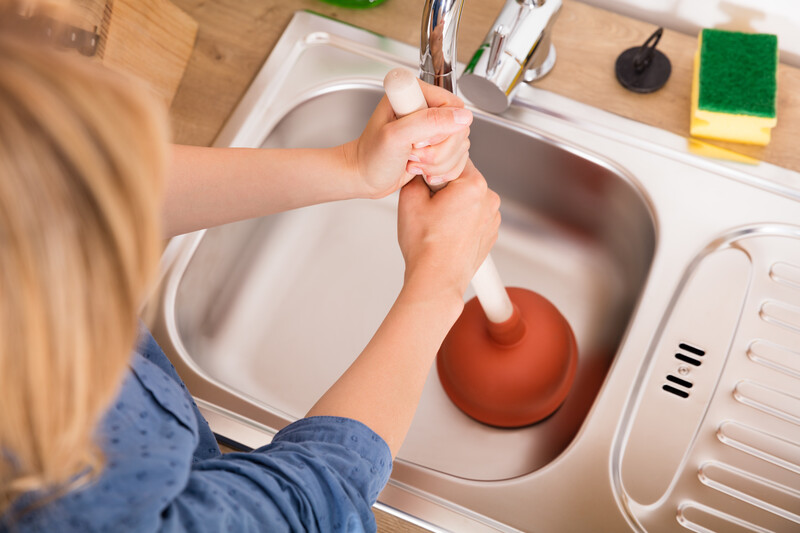Key Advice On How To Address A Slow-Draining Sink
Key Advice On How To Address A Slow-Draining Sink
Blog Article
The author is making several great annotation about 7 Ways To Fix A Slow-Draining Sink Before You Call A Plumber as a whole in this post down below.

Introduction
We have actually all existed: You're cleaning your teeth or cleaning your hands, and you see the water merging in the sink. As opposed to promptly swirling away, it remains, turning your once-refreshing morning regimen right into a mini swamp scene. A slow-draining sink isn't just aggravating; it's commonly a sign of bigger plumbing concerns prowling underneath the surface. The good news is that many slow-draining sinks can be fixed with a little expertise, a few standard tools, and some perseverance. Ready to tackle this task head-on? Let's roll up our sleeves and dive right in.
Understanding the Root Causes Of a Slow-Draining Sink
Prior to you begin poking around in your pipelines, it aids to understand what could be triggering the slowdown. Comprehending the source makes it less complicated to choose the right solution.
Usual Offenders Behind Slow Water Drainage
So, what's blocking points up? Generally, it's a combination of daily particles-- assume hair, soap residue, tooth paste deposit, and remaining food bits. Gradually, these tiny bits build up and cling to the pipeline wall surfaces, progressively narrowing the passage and making it harder for water to pass through. In some cases, natural resource from difficult water can likewise contribute to the substance, developing the ideal storm for persistent blockages.
When is it Time to Act?
If you discover the water draining pipes slower than common, it's a good concept to step in earlier instead of later. Waiting also long could lead to finish blockages, undesirable smells, and even pipe damages. If the water takes more than a couple of seconds to remove after turning off the tap, consider it a warning and prepare yourself to put on your DIY hat.
Devices and Products You'll Require
The right tools make all the difference. The good news is, you won't require a completely equipped plumber's van to finish the job.
Crucial Devices for Do It Yourself Repairs
A plunger is your best beginning factor. A small, sink-sized plunger produces suction that can displace small blockages. For even more consistent blockages, a drainpipe snake (in some cases called a plumbing professional's auger) functions wonders. A pair of gloves, a flashlight, and possibly a pair of safety goggles are additionally convenient.
Suggested Cleansing Solutions
Moderate dish soap and warm water can help break down greasy accumulation. A combination of cooking soda and vinegar is a tried and true natural remedy, and chemical cleaners supply a more eco-friendly technique. Maintain chemical drain cleansers as a last hope, as they can be rough on your pipelines.
Security First: Preventative Measures and Preparations
Before you launch into unclogging mode, think about security. You're managing possibly dirty water and debris, so slip on a pair of handwear covers. If you're using chemical cleaners, ensure the room is well-ventilated and follow the instructions on the label.
Protective Gear and Work Area Setup
Lay down some old towels or dustcloths around the sink location to catch splashes. Clear away any kind of products that may get in your method, like soap dispensers or toothbrush holders. See to it you have great lighting-- order a flashlight if required.
Step-by-Step Guide to Fixing a Slow-Draining Sink
Currently, allow's enter into the nitty-gritty. This detailed process will certainly direct you via straightforward methods to restore your sink's drainage.
Action 1: Remove and Tidy the Stopper
Commonly, the stopper (that small plug you push down to block water) is the very first culprit. Remove it meticulously and clean off any kind of hair or gunk caught around its base. Wash it completely prior to putting it back in place.
Step 2: Utilize a Bettor to Displace Particles
Got that bettor prepared? Position it over the drainpipe and give it a couple of firm pumps. The concept is to create suction that can loosen up any obstruction. If you see little bits of debris floating up, you get on the appropriate track.
Action 3: Attempt a Drain Snake or Cord Hanger
If the bettor does not work, it's time to bring out the drain snake. Delicately feed it into the drain and twist as you go. You may really feel some resistance-- that's likely the clog. Maintain twisting and pulling up until you eliminate the obstruction. If you don't have a drain snake, a corrected the alignment of wire hanger can work in a pinch.
Step 4: Use a DIY Drain Cleaner
An all-natural cleaner made from baking soda and vinegar can break down recurring gunk. Put half a cup of cooking soda into the drain, adhered to by half a cup of vinegar. Let it fizz for around 15 minutes, then flush with warm water. This chemical reaction often does marvels for minor obstructions.
Step 5: Reassemble and Examine the Sink
Placed every little thing back with each other and run the tap. Does the water currently swirl down the drain at a respectable speed? If yes, give yourself a pat on the back. Otherwise, do not misery-- there are still a few more tricks up your sleeve.
Different Approaches for Stubborn Clogs
Not all obstructions are developed equivalent. If your sink still declines to work together, think about these different options.
Baking Soda and Vinegar Approach
We already discussed this, however it's worth keeping in mind once again. This mild, environment-friendly technique is more secure than chemical cleaners and typically quite reliable.
Enzymatic Drainpipe Cleansers
Enzyme-based cleaners utilize all-natural bacteria to absorb organic matter. They're an exceptional selection if you're aiming to avoid extreme chemicals. Simply remember, they may take a bit longer to function their magic.
Chemical Drain Cleansers: Benefits And Drawbacks
Chemical cleansers can blow up via difficult clogs quick, however they're not without disadvantages. They can generate warm and fumes, damage pipelines if made use of exceedingly, and present environmental threats. Utilize them moderately, and always follow the directions thoroughly.
Safety Nets to Keep Your Sink Flowing
Avoidance is the very best treatment. By embracing a few easy practices, you can maintain your sink from slowing down to begin with.
Normal Cleansing Routines
Wipe down the sink basin and fixture location consistently. Eliminate hair or food particles before they have a possibility to wash down the drainpipe.
Avoiding Unsafe Compounds Down the Drain
Think twice before disposing coffee grounds, grease, or fibrous vegetable scraps down the sink. These culprits cling to pipeline wall surfaces, producing blockages in time.
Regular Upkeep Checks
Arrange a quick monthly inspection. Run warm water through the sink for a couple of mins, taking note of the flow. If it seems sluggish, act quick prior to it comes to be a full-blown clog.
When to Call an Expert Plumbing Technician
Sometimes, regardless of exactly how tough you attempt, that obstruct simply will not move. That's when it's time to generate the pros.
Indicators That Suggest an Extra Major Issue
If your sink drains pipes gradually regardless of numerous attempts, or if you discover water supporting in other fixtures (like your shower or commode), you might have a much more serious plumbing problem prowling much deeper in the system.
Balancing DIY Efforts with Specialist Assistance
While DIY can save you cash and supply a sense of accomplishment, there's no embarassment in calling a specialist. A professional plumbing can assess your whole pipes arrangement, making sure there's no underlying damage or long-lasting problem that can cost you a lot more later on.
Contrasting Expenses and Long-Term Solutions
Prior to choosing, take into consideration the big picture. An affordable, quick fix may fix the trouble temporarily, however buying a more permanent service can conserve you cash and stress in the future.
Weighing the Expenditures of DIY vs. Specialist Repairs
DIY fixes commonly set you back little greater than the price of a plunger or a bottle of cooking soda. Specialist services, on the other hand, come with a price however might protect against repetitive issues and expensive repair services later on.
Buying High Quality Fixtures and Upgrades
If your sink's layout adds to frequent clogs, it might be worth upgrading to higher-quality components or altering the plumbing format. Consider this a financial investment in your house's functionality and convenience.
Verdict
A slow-draining sink can feel like a small inflammation, but it's frequently an indication that your pipes needs a little TLC. By recognizing the root causes, using the right devices and techniques, and committing to simple preventive measures, you can keep your sink flowing openly. And when all else fails, never ever wait to hire an expert-- your home's plumbing is worth the investment in care and upkeep.
Three Common Ways to Fix a Slow Drain
Baking Soda Method
Boil a full pot of water. Measure out cup of baking soda and pour it down the drain. Then take cup of the magical cleansing substance known as white vinegar and drop that down there too. Allow the mixture to fizz in the drain for five minutes as the vinegar and baking soda combine. Now dump in that whole pot of boiling water. This combination of cleaning substances should clear out anything that is causing your sink to drain slowly. If it doesn t...
Zip-It
If the baking soda method doesn t clear out your drain, it may be because a significant amount of hair and/or other debris has collected there and you need to remove it. Purchase a Zip-It tool at any home improvement or hardware store and insert it into your drain. It will catch any collected hair or debris that s blocking the flow of water. Pull it out. If it s got a big clump of hair, etc. on the end, you ve probably got your culprit.
Drain Cleaner
If these methods don t work, there is the standard drain cleaner that you can also buy in a hardware store or even your local grocery store. It s better if you can use a household solution, but these drain cleaners often work in a pinch. They re very simple to use. You generally just dump them in your drain and wait. If even this method is not effective, it may be time to call the plumber.
https://www.mrrooter.com/oneida/about-us/blog/2017/july/three-common-ways-to-fix-a-slow-drain/

Do you really like reading about 7 Ways To Fix A Slow-Draining Sink Before You Call A Plumber? Try to leave a review directly below. We would be glad to hear your thoughts about this blog. We are looking forward that you visit us again in the future. If you please set aside a second to distribute this post if you enjoyed it. Thank you so much for taking the time to read it.
Go Company Report this page